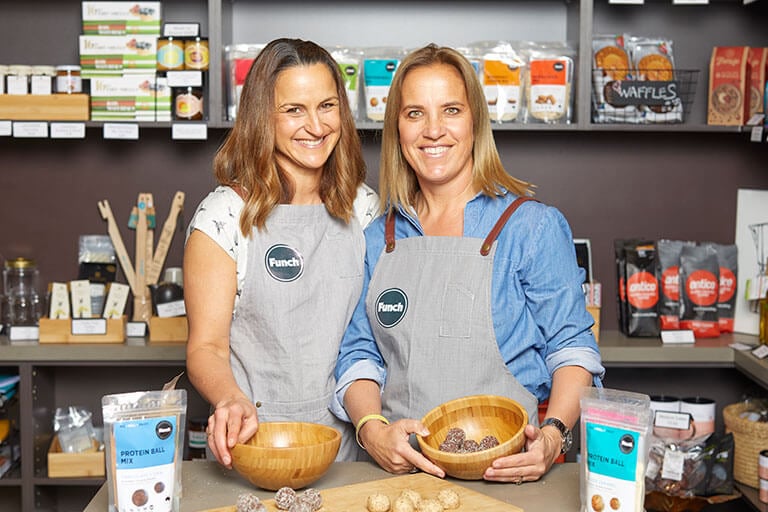Rather than marking a day on the calendar for women, why not the entire month of March? After all, March is Women’s History Month, first commemorated by the United Nations in the 1970s.
We’ve come a long way. Check the stats. In January 2019, there were 715,300 women business operators in Australia, or a 34.9 per cent share of all business operators. More than one-third. That marked an increase of 46,600 (or 2.0 per cent) in 12 months. Progress, but still a really long way to go.
As noted by one of the leading ladies in the line-up below, Bek McMillan of Gourmet Living, there’s value in reflection. We move so fast in business, but the past can be a useful study for building a better future. While there’s nothing quite like lived experience, some of the best lessons in life are still learnt through others.
We could glean insights from big business names and their even bigger success stories. That’s all well and good. But what about SMEs, those at the backbone of the Australian economy? After all, the challenges at $1 million in turnover are quite different to those you face at $1 billion.
You can’t be what you can’t see, so we’ve pulled together insights from female-led SMEs about starting and scaling business, managing cash flow, work-life balance, and perhaps most important of all, the importance of backing yourself as a business owner first. These are all the elements of doing meaningful work, or as we like to say at Moula, good business. Here they are.

Bek McMillan worked as a chef in London and Melbourne for 12 years before taking the leap to start Gourmet Living. She connects small-scale local producers with foodies in the city. Bek offers good advice around managing your numbers in business and finding value in pause and reflection.
What Bek wishes she’d known
Bek has learnt a lot in the last eight years of running a business, but the most important lesson for her, and the one she wishes she knew starting out, was learning to master her numbers.
“There’s lots I wish I knew but I guess coming from a cheffing background and stepping into a retail store, I wish I knew how important numbers were and capturing people’s data. I was all over customer service and I thought that was what grew your business. Because if you’re great at getting your customers in the door and then you give them a great experience then it’ll work out, won’t it? That’s not necessarily the case and having seen the impact of managing your numbers, I really wish I was doing it earlier on.”
Why transparency is key in business
Sometimes, a cash flow crunch is connected to a late payments issue. Bek deals with late payments the same way she deals with everything in business: clearly and transparently. Late payments are an issue for many businesses (luckily, now there are good solutions).
“We deal with cash flow challenges by being super honest. I think it’s important to be transparent. There’s nothing worse than being chased by someone in an abrupt manner so we never do that. I find it works best when you open up a dialogue with them, be honest, let them know it’s been x number of days since it was due and ask them when we can expect payment. And let them know we need to organise some payments and things on our end too. There’s nothing worse than people ignoring phone calls and emails so an honest, open and transparent relationship works much better.”
On taking time to stop
“I think it’s really important to take time to review your business. I just try to take things a couple at a time, so I’m not too overcommitted. I used to make too many changes to too many things all at once because I thought changes had to happen all at once, but I’ve learnt to plan more and make more manageable changes more often. I like to start the year fresh and so we plan for the year ahead because September to December are our busiest months so we need to action our plans before that peak period because from September 1st until the new year our focus is purely on retail. We’re so busy I don’t have it in me to implement anything then, it’s a matter of allowing the work we’ve done earlier in the year do its thing. We reevaluate new campaigns too, so we may review two weeks in and then another month later so we can see if we can ramp it up or make any changes to improve it.”

Lisa Bourne and Tanya Duncan found bliss together in business in a rather serendipitous way. They met at the gym and became good friends when their kids started school together. A fruitless search for healthy, sugar-free snacks for their kids’ lunches led the pair to co-found Funch in 2014.
On building a good business
At its core, Funch is a business with heart, with Lisa and Tanya working hard behind the scenes to minimise their environmental impact. For them, it’s all about providore and purpose.
“We looked for a cause that we could help the most, and food waste is a huge issue in our society. But the way that we actually manufacture and produce Funch means that there isn’t any wastage in our production process. So we went back to the drawing board and that’s when we found OzHarvest. I was aware of some of the programs they run, including providing healthy lunches to kids who come to school hungry. I think every school kid should have the opportunity to eat healthy food, not just the ones who theoretically can afford it, so we donate Funch mixes so kids can eat healthily. People can also help kids in need by purchasing a bucket for a school canteen and we donate a packet. It’s our way of supporting kids who otherwise wouldn’t have the opportunity to be eating healthy snacks at school.”
Overcoming cash flow challenges
Cash flow challenges are only natural in business. While unpleasant, Lisa and Tanya don’t get bogged down by cash flow woes, reminding themselves that ‘slow and organic’ growth often leads to being ‘more creative and strategic’.
“Cash flow is always challenging. Trying to juggle the periods from when we make the products, sell the products, and then get paid, is difficult. Depending on who we’re dealing with there’s always that delay between production and payment. So that’s really tricky, and that is something we always have to keep an eye on, talk about, and manage as best we can. Because of that, and because we’re fully self-funded – we have no investors – our growth has to be strategic. We can’t do everything we want all at one time, so we prioritise. It means our growth is slower and more organic, but it forces us to be more creative and strategic.”
Tanya’s top tip
“One bit of advice I wish I knew when we were starting out is to understand your margins. Also the importance of cash flow in keeping your business going. If you don’t understand your margins, they’re not big enough, you’re not selling your product for enough. You might also be selling a product for too much and you might be more successful with a leaner margin. So I guess it’s understanding your margins so you know what will work best. Managing your cash flow underpins the ongoing viability of your business.”

Growing up on a farm in Zimbabwe, Melanie Townsend has honed a fine skill in making a little go a long way. Driven by passion and purpose, through her business Vanilla Zulu, Melanie has challenged unconscious bias to start culinary schools on two different continents.
On backing yourself
For a while, Mel felt like she was living the dream. She travelled the world as a chef while working for a large international culinary services company, before getting the urge to settle down and take a management role closer to home. Missing the craft, Mel bucked well-meaning advice and decided to back herself.
“I took a management role with Compass and worked my way up to Area Manager. While it was great pay and I had a company car and I was managing a bunch of different units, there was no cooking and I just missed working with food. I walked into my boss’ office and told him I was resigning to start my own cooking school. He looked at me and said he would hold my role for me because nobody wanted to learn how to cook. He said outright that it was a silly idea. He’s still a good friend of mine so I make sure to send him every newspaper article and awards I get.”
Asking for help when you need it
“It’s important to identify your weaknesses and work out solutions for them. Ask for help. You’re human, you can’t possibly know everything. I identified early on that I was terrible at asking for help, so made a concerted effort to ask for help any time I didn’t know what to do, and early on too. There’s no point waiting until the problem has escalated. My life has become infinitely easier since I started asking for help.
“I’ve had some brilliant mentors along the way. Running your own business can be really lonely. You can’t lean over to the desk next to you and use your colleague as a sounding board. You need to pick up the phone or find someone to chat to. It’s amazing to have someone with objectivity and a fresh set of eyes help you work on a challenge. More people should surround themselves with mentors in different industries too. Anyway they can help improve your weaknesses will help you.”
The importance of keeping good company
“I’m able to work around my gorgeous children – I can pick them up from school and then, once they’ve gone to bed, work to 10pm. It’s great being flexible now the business is at a point where staff can take some of my workload. I have a brilliant financial controller who makes sure there are numbers in the right columns, and my fabulous chefs handle some of the classes so I’m not working every single shift. I now have a PR officer who handles media releases and marketing too. I’ve built a team of passionate staff who are highly capable and help me get the job done efficiently and beautifully. Gone are the days when I did everything on my own. Now I have more time to go to sports days and do all the important things.”




